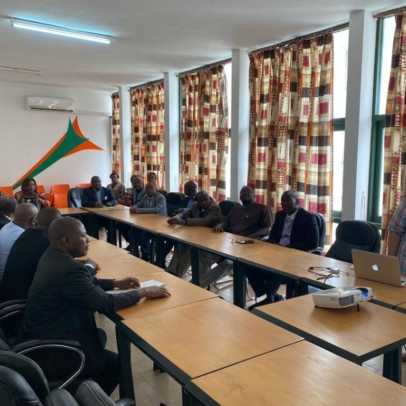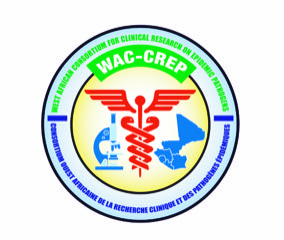
Significance of clinical research for preparedness and response to epidemics: Establishment of the West Africa Consortium for Clinical Research (WAC-CREP). The west African region was affected by an unprecedented 2014-2015 Ebola Virus Disease (EVD) outbreak that claimed more than 11,000 lives. The outbreak occurred in the midst of a weakened health system with limited research capacity and coordination platforms at the sub-regional level.
On the other hand, the weakened health system and the limited capacity for timely needed clinical research to address clinical trials for Ebola vaccine and treatment within the sub-region further cemented the reasons to foster regional collaboration and knowledge sharing platform, on clinical research.
On July 2015, it was agreed unanimously through the Guinea-Conakry communique for the establishment of a sub-regional body on clinical research and other emerging and re-emerging infectious diseases.
The West Africa Consortium for Clinical Research (WAC-CREP) with focus on emerging infectious diseases was borne out of a shared interest by Guinea, Liberia, Sierra Leone and Mali to advance regional preparedness for global health security by sharing regional research, best practices, and evidence to inform infectious disease policy. The emergency Ebola vaccine clinical trials that led to a large vaccination in Guinea and Liberia heightened the prior to the outbreak, there was limited recognition of the importance of clinical research preparedness and developing clinical research capacity.
Objective of WAC -CREP
The wide range of non-specific clinical presentations and non-descript symptoms that occur from infections by various epidemic pathogens impede diagnoses based strictly on clinical manifestations, even for experienced physicians. Symptoms related to these epidemic pathogens may be easily attributable to other infectious diseases, particularly malaria and a variety of other etiological agents that account for high prevalence in West Africa. There is limited understanding regarding the scope and magnitude of these emerging pathogens.
This clearly suggests that outbreaks from emerging viral diseases may randomly occur in these countries; thereby, leading to significant disease burden in the absence of a strong health system capable of rapid and integrated response. In addition, the majority of the population reside in remote rural settings with ecologic landscapes that place them at increased risk for rodents and arthropod-borne diseases. Factors that contribute to undetected spread of these epidemic pathogens and further impede rapid containment measures include:
(1) weakened healthcare delivery systems and laboratory infrastructure with shortage of qualified health workers;
(2) high population mobility across porous borders;
(3) cultural beliefs and behavioral practices (e.g. traditional burial and funeral practices, community resistance and misconceptions about unfamiliar diseases);
(4) lack of proven vaccines, therapeutics, or other preventative measures;
(5) weakened systems of integrated vector managements; and
(6) manifestations of epidemic pathogens with diverse clinical and epidemiological features, among others.
The WAC-CREP was established to collaborate with the sub-regional Ministries of Health to strengthen capacities and partnerships to detect and respond effectively to epidemic threats based on evidence from clinical research.
Therefore, the overall goal of the consortium is to advance sub-regional epidemic preparedness and response for Global Health Security through multidisciplinary, integrated collaborative research and training initiatives to facilitate evidence-based health policy for surveillance and control of epidemic pathogens.
The vision of WAC -CREP
is to save lives through collaborative clinical research on emerging infectious diseases contributing to improve global health security. The mission is to advance regional preparedness for global health security through collaborative research, sustainable research capacity, and evidence-based health policy.
The overall objective is to strengthen sub-regional collaboration for preparedness to mitigate epidemics through clinical research platform, harmonized framework and capacity building.
The specific aims are:
- Strengthen institutional capacity to facilitate the training and development of the next generation ofclinical research scientists and health professionals to conduct high quality clinical research to addressglobal health security needs
- Develop sustainable institutional framework for translational clinical research, advocacy to disseminateand promote the utilization of findings to support epidemic surveillance through networking
- Promote community engagement to facilitate clinical research and epidemic preparedness, surveillanceand response in the sub-region
- Establish harmonized clinical research platform to strengthen ethical and regulatory procedures acrossthe subregion
The consortium will contribute to preventing the spread of emerging pathogens by enhancing early detection of infections, addressing the changing landscape of emerging pathogens, the development and validation of innovative point of care diagnosis tools, vaccine or therapy in low resource setting.
Stakeholders
Goverments :
- Republic of Liberia
- Republic of Sierra Leone
- Republique du Guinea
- Republique du Mali
Regional Affiliates :
- Mano River Union (MANU)
- West African Health Organization (WAHO)
- Academic Institutions (Universities) with Research Portfolio in the region
Values :
- Collaboration
- Integrity
- Regional leadership
- Transparency
- Urgency
- Capacity building
- Knowledge sharing






